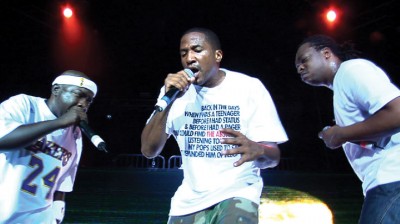Beats, Rhymes and Life: the Travels of a Tribe Called Quest Dvd Cover
Beats Rhymes & Life: The Travels of a Tribe Called Quest
List Cost: Unknown [Buy now and relieve at Anrdoezrs]
Reviewed at the 2011 Tribeca Motion-picture show Festival Michael Rapaport's Beats Rhymes & Life: The Travels of A Tribe Called Quest opens with footage from the group's 2008 headlining spot on the Rock the Bells tour. The footage is slowed-down, though, accompanied past semi-provocative interview snippets. The sound is eerie, virtually ghostly, simply in a mode that's appropriate--the motion picture summons spirits of hip-hop and lets them rattle effectually for a while, for one-time time'southward sake. The energy of the music crackles through every frame. Information technology is also a story of collaborative tension--seen from the beginning, as leader Q-Tip is shown, in a shaky, hand-held shot, despairing of the group and announcing its end backstage at the testify. "I did everything I could exercise," he proclaims. "Twenty years!" And with that, Rapaport revisits those twenty years. The four members of A Tribe Called Quest (Q-Tip, Phife Dawg, Ali Shaheed Muhammad, and occasional fellow member Jarobi White) all hailed from the boroughs of New York Metropolis, and came to dear rap music during its showtime gilt age in the mid-1980s. Their ascent to success is duly chronicled--equally themselves, and equally part of the "Native Tongues" move (with such like-minded acts every bit De La Soul, the Jungle Brothers, Queen Latifah, and Monie Dearest)--the positive, Afrocentric aesthetic that was vital part of hip-hop music in the early '90s. The Tribe released five great albums in viii years, only then they cruel apart; "the chemistry was dead," Phife explains now, and the steadily-mounting differences between he and Q-Tip led to, in Phife'south words, "a bitter break-upward" in 1998. Ten years afterward, they reunited to headline Rock the Bells, and Rapaport's cameras capture that contentious period, seeming to certificate the conflicts accident by accident--backstage fights, lamentatory in media, creating an infectious disharmony (when members of De La Soul are asked if information technology will be the Tribe's last bout, one immediately replies, "I hope it is!"). The film nearly becomes their Let It Be; there'due south a bubbling power in those concert scenes, which are shot in close and upward tight, studying the complexity of what's happening betwixt these guys. Members of the group (particularly Q-Tip) have been vocal in their disapproval of Rapaport's film; Tip's displeasure with it is probably understandable, because how poorly he comes out in some of it. Various interviewees describe him as an egomaniacal control freak (Jive CEO Barry Weiss: "I honey Q-Tip, but he'southward a fuckin' nut"), and his backstage ravings don't present him in the all-time low-cal, while he doesn't exercise himself whatsoever favors with an offhand comment about "faggoty shit to say." What is most interesting in that scene, though, is how the camera catches a glimpse of Ali's face and holds on it while Tip goes off; this guy, caught in the middle, doesn't know what the hell to practice anymore. And then Rapaport is conspicuously on Squad Pfife. (In a lengthy interview with MTV News, the other members provide a host of other issues, only studiously avoid that one.) Does information technology make the picture feel loaded? Maybe, a little. Simply it likewise makes it dramatic, and to exist fair, Q-Tip doesn't come up off similar a villain; he's just a hard-working and occasionally difficult creative person, as countless others accept been and will exist. And the gossipy Tip-said/Phife-said stuff is far from the motion-picture show's primary allure anyway. It'southward funnier than you might expect; Tip and Pfife do a back-and-forth about the Knicks and the Lakers that's uproarious, and the interview subjects (particularly Black Thought from the Roots) add plenty of levity. Rapaport assembles a remarkable group of artists to comment on the Tribe, those they influenced and those who influenced them, discussing with keen insight exactly what information technology was that made the group and then fresh and new. All-time of all, in but a few minutes of screen time, Rapaport (and his editors and subjects) wonderfully evoke that period of rap music that these guys came up in the eye of. The picture taps into the excitement of that moment in hip-hop music and hip-hop culture; information technology remembers what it is to crouch near your tape deck set up to hit pause when a good jam comes on (Ali even remembers the difficulty of tuning a non-digital radio). Beats Rhymes & Life: The Travels of A Tribe Called Quest is a breathlessly entertaining film; it moves quickly and nimbly, conjuring up a wonderful moment and letting us bask it one more time. Jason lives in New York. He holds an MA in Cultural Reporting and Criticism from NYU. 
0 Response to "Beats, Rhymes and Life: the Travels of a Tribe Called Quest Dvd Cover"
Post a Comment